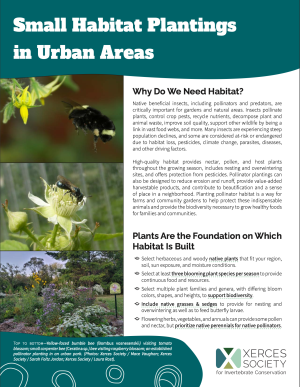
Native beneficial insects, including pollinators and predators, are critically important for gardens and natural areas. They pollinate plants, control crop pests, recycle nutrients, decompose plant and animal waste, improve soil quality, support other wildlife by being a link in vast food webs, and more. Many insects are experiencing steep population declines, and some are considered at-risk or endangered due to habitat loss, pesticides, climate change, parasites, diseases, and other driving factors.
High-quality habitat provides nectar, pollen, and host plants throughout the growing season, includes nesting and overwintering sites, and offers protection from pesticides. Pollinator plantings can also be designed to reduce erosion and runoff, provide value-added, harvestable products, and contribute to beautification and a sense of place in a neighborhood.
Planting pollinator habitat is a way for farms and community gardens to help protect these indispensable animals and provide the biodiversity necessary to grow healthy foods for families and communities.
